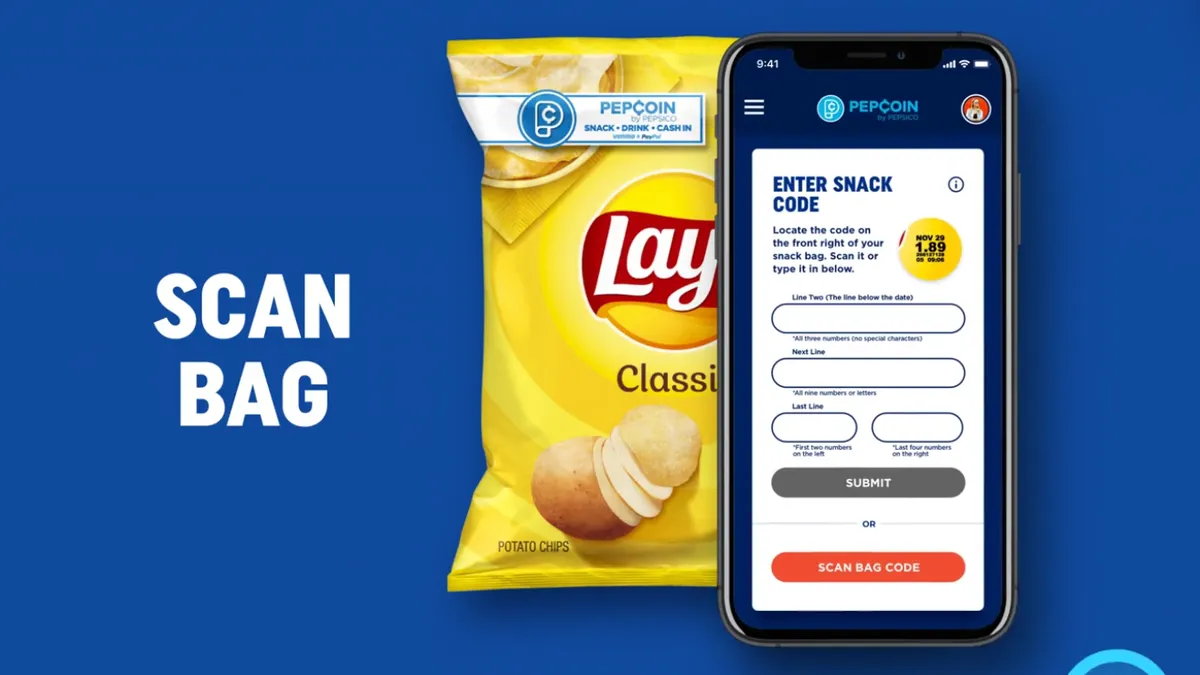Brief:
- PepsiCo created its first cashback loyalty program, giving customers a chance to earn rewards when they buy its soft drinks and Frito-Lay snacks together, per an announcement. PepCoin lets mobile customers scan codes under bottle caps and on snack bags with their smartphone cameras to earn back as much as 10% of the purchase prices, per its website.
- PepCoin members need to earn at least $2 before the cash is automatically transferred to their accounts with Venmo or PayPal. The codes can only be scanned once, and snack and beverage pairings must be scanned within 48 hours of each other. To join the program, customers need to create an account at the PepCoin.com website.
- PepCoin has more than 1,000 possible pairings of soft drinks and snacks among the company's brands, which include Pepsi, Mtn Dew, Lipton bottled drinks, Aquafina, Lay's, Doritos, Cheetos, Ruffles, Fritos and SunChips.
Insight:
PepsiCo's rewards program aims to foster loyalty among customers as mobile optimization has become key to customer engagement with loyalty programs, according to researcher Gartner L2, which found that brands also have recognized the need to diversify their rewards as programs proliferate. The portion of loyalty programs that offered experiential rewards and monetary benefits grew to 61% in 2018 from 47% a year earlier.
By working with PayPal and its mobile payment platform Venmo, PepsiCo can reach younger consumers who are more familiar with mobile payments. Seventy-nine percent of Generation Zers use person-to-person payments at least once a month, compared with 75% of millennials and 69% of Gen Xers, per a survey by digital payments company Billtrust. PayPal and Venmo will benefit as fans of PepsiCo products sign up for digital accounts to collect their cash rewards.
"PepCoin is tailor-made for young lifestyles," said Kate Hogenson, senior loyalty consultant at Kobie, in comments emails to Mobile Marketer. "Cash poor millennials and Gen Z are often more active in loyalty programs than older generations because the programs help them make their limited cash go further, and they enjoy perks like early access to new items and sales. The trick for PepsiCo is to offer these perks in a way that makes consumers want to engage with their program to avoid losing their attention."
PepCoin gives PepsiCo a way to gather consumer data that includes purchase history, date of birth, location, email address and phone number. In signing up for PepCoin, customers can opt in to receive emails about offers and transactions, and SMS messages about news and promotions. That opens an efficient direct channel to reach online customers who may not see advertising on other media platforms. PepsiCo also can send special offers to target groups whose purchase activity has waned, helping to drive sales.
PepsiCo also has created loyalty programs in the past, such as its Pepsi Loot program in 2010 that relied on geotargeted data from Foursquare to drive traffic to restaurants that sold Pepsi products, such as Taco Bell, Pizza Hut and Arby's. The program offered points that customers could redeem for free music downloads. Unlike Pepsi Loot, the PepCoin program is intended to be permanent, Engadget reported.
Smartphones are making loyalty programs more convenient for customers, freeing them from having to dig around for plastic cards or key fobs to scan at checkout. Mobile apps and websites also give loyalty members a chance to see their progress in accumulating points or cash-back rewards. The percentage of U.S. consumers who said a mobile-enabled loyalty program makes them visit a store or buy more frequently rose to 61% this year from 52% in 2016, per a survey by 3Cinteractive.
Loyalty programs have become more popular among a wider variety of brands that aim to cut through ad clutter and boost customer lifetime value (CLV). Retail chain Target next month will introduce its Target Circle loyalty program that offers 1% cash back, personalized deals and early access to sales. Chipotle Mexican Grill boosted downloads of its mobile app nearly fivefold with the nationwide rollout of a loyalty program used Venmo to give cash back to customers. Starbucks has made its mobile app a central part of its successful loyalty program, along with ordering and payments.














